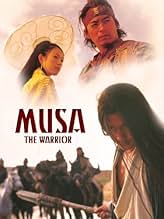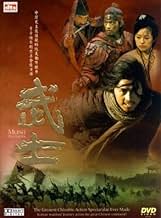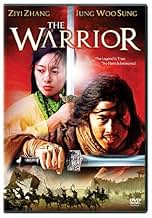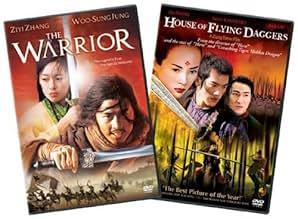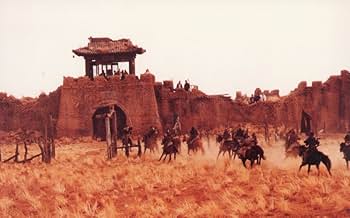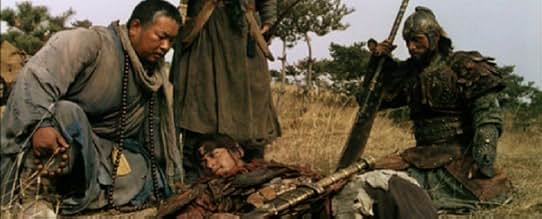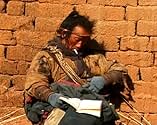VALUTAZIONE IMDb
7,1/10
11.430
LA TUA VALUTAZIONE
Aggiungi una trama nella tua lingua1375. Nine Koryo warriors, envoys exiled by Imperial China, battle to protect a Chinese Ming Princess from Mongolian troops.1375. Nine Koryo warriors, envoys exiled by Imperial China, battle to protect a Chinese Ming Princess from Mongolian troops.1375. Nine Koryo warriors, envoys exiled by Imperial China, battle to protect a Chinese Ming Princess from Mongolian troops.
- Regia
- Sceneggiatura
- Star
- Premi
- 6 vittorie e 11 candidature totali
Ziyi Zhang
- Princess Bu-yong
- (as Zhang Ziyi)
Park Jeong-hak
- Ga-nam
- (as Park Jung-hak)
Jeong Mi-nam
- Yongho Soldier
- (as Mi-Nam Jung)
Recensioni in evidenza
Someone insulted the Korean movie industry by stating this is one of Korea's best films. I must be honest, I couldn't get myself to see the entire movie, which is a rarity for me. By the time I decided to stop torturing myself the following had occurred in the movie.
1)The tempermental and rebellious "hero" who has a serious self control problem gets the entire ancient Korean Caravan in trouble with his psychotic propensity towards violence. The Caravan saves themselves and the hero with cunning and wit. 2)The "hero" puts the entire Caravan in jeopardy again by cutting off the head of one of the merchants. This time many Caravan members die but they still escape relatively intact. 3)The Caravan finds a way to escape from their dire situation but the "hero" puts an end to their salvation by doing something totally stupid and irrational. Again, the great leadership, solidarity, and fighting ability of the Caravan saves them from disaster.
By this time, I began to beg someone to have the senses to kill the "hero" who was getting everyone else killed with his irresponsible actions. Instead of languishing in frustration, I decided to use my remote control.
The "hero" is played by Jung Woo Sung, one of the worst, and yet one of the most popular, actors in Korea. The only characters he usually plays are the silent rebellious types who act angry all the time, probably to hide his lack of acting ability.
This was the most expensive movie made in Korea (few films have surpassed it since). Yet it was a box office bomb, and with a good reason.
1)The tempermental and rebellious "hero" who has a serious self control problem gets the entire ancient Korean Caravan in trouble with his psychotic propensity towards violence. The Caravan saves themselves and the hero with cunning and wit. 2)The "hero" puts the entire Caravan in jeopardy again by cutting off the head of one of the merchants. This time many Caravan members die but they still escape relatively intact. 3)The Caravan finds a way to escape from their dire situation but the "hero" puts an end to their salvation by doing something totally stupid and irrational. Again, the great leadership, solidarity, and fighting ability of the Caravan saves them from disaster.
By this time, I began to beg someone to have the senses to kill the "hero" who was getting everyone else killed with his irresponsible actions. Instead of languishing in frustration, I decided to use my remote control.
The "hero" is played by Jung Woo Sung, one of the worst, and yet one of the most popular, actors in Korea. The only characters he usually plays are the silent rebellious types who act angry all the time, probably to hide his lack of acting ability.
This was the most expensive movie made in Korea (few films have surpassed it since). Yet it was a box office bomb, and with a good reason.
I think it was nearly a year ago that I came across the website and first started anticipating the movie eagerly. The site contained lots of stills from the movie throughout, and every single one of them was utterly beautiful, like it had been painted to perfection rather than captured in motion. It seemed unreasonable to expect the whole movie to look that good, but I was pretty sure that it was going to be impressive. With so much anticipation and hope for a movie, it seems almost inevitable that you are going to be disappointed when you finally see it. All the more surprise then that MUSA meets and surpasses my expectations in every way!
First things first, yes... it really does look that good! All the way through . Like Zhang Yimou's SHANGHAI TRIAD, practically every frame is beautifully composed and rendered, and could easily hang on a gallery wall somewhere. There wasn't a single shot that I could imagine looking better than it did. The production design is incredible, the locations stunning, the special effects groundbreaking (the gore). I can't imagine how much time and money must have gone into its production, let alone talent and dedication.
MUSA is epic in the word's biggest sense - I couldn't help thinking of Homer's ILIAD and ODDYSEY in many parts, and those are basically the two stories that the word 'epic' was invented for. It makes Gladiator, Crouching Tiger etc look positively inconsequential. The movie is also made with an attention to detail that is remarkable. It is certainly the most convincing evocation of [relatively] ancient times that I have seen. You will really believe that you've been transported back to 400 something AD China, where Zhang Ziyi happens to be a princess and Yu Rong Guang a Mongol general. I really felt "Yes, this is what life was like back then. This is how things looked, this is how people behaved".
Despite the epic nature of the story, the central focus is always on a small-ish cast of characters, each of whom is very well conceived and developed throughout the movie's course. I'd guess there's about 15 major characters in the story, and a significant cast of minor characters. The performances are all superb - I'm pretty sure the actors themselves were quite convinced they really were their characters. The believability is enhanced by the costuming, makeup and I guess just good casting - all the different factions involved in the story totally look the part.
No epic would be complete without battle scenes, and MUSA has quite a few. These are all stunningly choreographed and filmed, not in a HK style like Bichunmoo, but in a completely real style. Beautifully shot of course, but the men fight like skilled soldiers really would (I'm sure), and get wounded/killed equally convincingly. The special effects of arrows and blades penetrating flesh are sometimes shockingly convincing. This might be disturbing to some, but it isn't played for titillation - it just adds to the gravity of the experience. It may be a little conspicuous that the heroes all manage to dispatch many times their own body weight in enemies, but you've got to give them *some* leeway for narrative convention .
There is a lot of planning involved in the battles, of a military nature, and this is also very convincing and fascinating. Almost as large a part of the process as the actual getting down to it with the weapons. A very believable insight into how battles were waged in the days when a bow & arrow was as hi-tech as weaponry got.
Hmmm... is there any aspect of the movie I haven't gushed praise over yet? A nod to the soundtrack I guess - good, very fitting. Sound effects in the battles are excellent. Ummm... and the lighting is really good too .
A cursory nod must be made to the films flaws as well though, lest I leave the reader with expectations of *total* perfection. The main flaw is that the movie wanders rather too far into melodrama & a little cliche towards the end. It would probably be kind of cheesy, except that it's all so well done you can't get too upset with it .
First things first, yes... it really does look that good! All the way through . Like Zhang Yimou's SHANGHAI TRIAD, practically every frame is beautifully composed and rendered, and could easily hang on a gallery wall somewhere. There wasn't a single shot that I could imagine looking better than it did. The production design is incredible, the locations stunning, the special effects groundbreaking (the gore). I can't imagine how much time and money must have gone into its production, let alone talent and dedication.
MUSA is epic in the word's biggest sense - I couldn't help thinking of Homer's ILIAD and ODDYSEY in many parts, and those are basically the two stories that the word 'epic' was invented for. It makes Gladiator, Crouching Tiger etc look positively inconsequential. The movie is also made with an attention to detail that is remarkable. It is certainly the most convincing evocation of [relatively] ancient times that I have seen. You will really believe that you've been transported back to 400 something AD China, where Zhang Ziyi happens to be a princess and Yu Rong Guang a Mongol general. I really felt "Yes, this is what life was like back then. This is how things looked, this is how people behaved".
Despite the epic nature of the story, the central focus is always on a small-ish cast of characters, each of whom is very well conceived and developed throughout the movie's course. I'd guess there's about 15 major characters in the story, and a significant cast of minor characters. The performances are all superb - I'm pretty sure the actors themselves were quite convinced they really were their characters. The believability is enhanced by the costuming, makeup and I guess just good casting - all the different factions involved in the story totally look the part.
No epic would be complete without battle scenes, and MUSA has quite a few. These are all stunningly choreographed and filmed, not in a HK style like Bichunmoo, but in a completely real style. Beautifully shot of course, but the men fight like skilled soldiers really would (I'm sure), and get wounded/killed equally convincingly. The special effects of arrows and blades penetrating flesh are sometimes shockingly convincing. This might be disturbing to some, but it isn't played for titillation - it just adds to the gravity of the experience. It may be a little conspicuous that the heroes all manage to dispatch many times their own body weight in enemies, but you've got to give them *some* leeway for narrative convention .
There is a lot of planning involved in the battles, of a military nature, and this is also very convincing and fascinating. Almost as large a part of the process as the actual getting down to it with the weapons. A very believable insight into how battles were waged in the days when a bow & arrow was as hi-tech as weaponry got.
Hmmm... is there any aspect of the movie I haven't gushed praise over yet? A nod to the soundtrack I guess - good, very fitting. Sound effects in the battles are excellent. Ummm... and the lighting is really good too .
A cursory nod must be made to the films flaws as well though, lest I leave the reader with expectations of *total* perfection. The main flaw is that the movie wanders rather too far into melodrama & a little cliche towards the end. It would probably be kind of cheesy, except that it's all so well done you can't get too upset with it .
Those who settle down to enjoy the excellent 150-odd minute Musa will be surprised at how much it suggests a Western. There's sweeping landcapes, a cross-desert ordeal; competition between villains and heros, 'stagecoach' chases, abandoned and defended forts, and 'cavalry' charges. These, as well as a strong sense of a man-having-to-do what-a-Man-has-to-do, combine to create familiarity to those who know such films as (for instance) The Alamo and Commanche Station. That's not to say that Musa has no originality, or is not strongly rooted within Korean national cinema. It contains a number of striking set pieces - notably the several pitched battle scenes, multiple characterisation, as well as some insight into the various power struggles which make up mid-fourteenth century Asian history. But at the heart of this package remain a well-tried fairy story, that of a cold Princess who must learn to swallow her pride, and of a brave servant's unrequited love.
Sung-Su Kim, who directs from his own screen play, does a very good job in drawing together his disparate group of travelling companions on a dangerous journey: a Princess, a General, a monk, soldiers, wives, a cowardly translator, a whore, etc. To provide suitable contrast between the moments of combat, he relates them in short, effective, dialogue scenes. Its good to see a film too in which the ubiquitous wire work and over the top gymnastics, beloved by some Eastern action directors, is conspicuous by its absence. Its also one where the director relies less on extreme camera angles and special effects to create visual drama than on the regular ebb and flow of dramatic editing. Perhaps because of this 'naturalness', the battle scenes are consistently exciting and involving. They are also staged in enough different locales to make them varied viewing each time. A standout is a desperate confrontation amongst trees, where the director takes full advantage of foliage cover, confusion, and events within the frame to create some real martial suspense.
The HK disc I saw was generally excellent, with occasional errors in subtitle grammar, as well as the odd compression problem (on-screen blur), usually during horizontal tracking movements. All told, though, the cheap price of this disk makes it an excellent buy and I strongly recommend it - and the film.
Sung-Su Kim, who directs from his own screen play, does a very good job in drawing together his disparate group of travelling companions on a dangerous journey: a Princess, a General, a monk, soldiers, wives, a cowardly translator, a whore, etc. To provide suitable contrast between the moments of combat, he relates them in short, effective, dialogue scenes. Its good to see a film too in which the ubiquitous wire work and over the top gymnastics, beloved by some Eastern action directors, is conspicuous by its absence. Its also one where the director relies less on extreme camera angles and special effects to create visual drama than on the regular ebb and flow of dramatic editing. Perhaps because of this 'naturalness', the battle scenes are consistently exciting and involving. They are also staged in enough different locales to make them varied viewing each time. A standout is a desperate confrontation amongst trees, where the director takes full advantage of foliage cover, confusion, and events within the frame to create some real martial suspense.
The HK disc I saw was generally excellent, with occasional errors in subtitle grammar, as well as the odd compression problem (on-screen blur), usually during horizontal tracking movements. All told, though, the cheap price of this disk makes it an excellent buy and I strongly recommend it - and the film.
It's Ancient China circa 1375, the Koryo king sent a diplomatic delegation of diplomats, soldiers, and a mute slave to the Ming emperor to make peace between the Yuan and Ming dynasties, but they are regarded as spies, and thus are dispatched to a remote desert. So they begin a journey to get back home, but after learning that a Ming princess has been kidnapped by Yuan troops, the same troops that they had met and fought with earlier, they see that if they rescue her it's possible that they can get a ship needed to sail home. Cinematic ally this is a beautiful film, the action suitably epic and the film even poetic at times. I can safely say that this film is a wonder to behold even in it's edited Iternational incarnation.
My Grade: A
Region 0 DVD Extras: nothing and it's the 132 minute international cut. I love this film, but try your best to seek out the R2 Scandinavia 3-Disc SE, as it has the longer 155 minute version AND the international cut AND a great deal of extras
My Grade: A
Region 0 DVD Extras: nothing and it's the 132 minute international cut. I love this film, but try your best to seek out the R2 Scandinavia 3-Disc SE, as it has the longer 155 minute version AND the international cut AND a great deal of extras
Emissaries from Korea stumble across an attempt by Mongol warriors to kidnap a Chinese princess. Nice clean and simple premise for a Summer blockbuster, one whose marketing (and casting) coasts on the popularity of Crouching Tiger and Hero but whose execution is very different.
I saw this one by accident thinking it was Hero, the massive 2002 Oscar nominee also starring Zhang Ziyi (and, for all its dodgy ideology, worth discovering for the visual feast alone). The region 2 (Korean & French audio 5.1) looked good so I rented it... Back when that was still a thing.
First, this is not Hero, nor is it a wuxia or wire-work driven martial arts film. This is a Historical action film, and despite the prowesses of its heroes, Musa's violence is realistic and brutal. It is a very clever men-on-a-mission flick, with interesting balance and variety within the team, with echoes of Seven Samurai. Where things take an even more pleasant turn are in the interesting portrayal of our characters: a borderline unlikable "hero" (or so he seems at first) and princess, great nobility in the lower ranks, and a surprisingly likable and charismatic villain, if indeed you can call him that.
In production value terms, this can compete with anything Hollywood churns out, and the technical credits, from editing to earthy cinematography, are all excellent. Fast-shutter action, made popular by Saving Private Ryan and Gladiator, is put to brutal use here, and there is a fine balance of chaotic individual moments and interesting strategies, something that would later be explored in John Woo's Red Cliff. This film procures that very rare delight of watching a film and knowing exactly where all the money, effort and care went, because it is all up there on screen, and for once, equally distributed, performances included. Something you have got to see.
For your consideration, ladies and gentlemen: Musa.
I saw this one by accident thinking it was Hero, the massive 2002 Oscar nominee also starring Zhang Ziyi (and, for all its dodgy ideology, worth discovering for the visual feast alone). The region 2 (Korean & French audio 5.1) looked good so I rented it... Back when that was still a thing.
First, this is not Hero, nor is it a wuxia or wire-work driven martial arts film. This is a Historical action film, and despite the prowesses of its heroes, Musa's violence is realistic and brutal. It is a very clever men-on-a-mission flick, with interesting balance and variety within the team, with echoes of Seven Samurai. Where things take an even more pleasant turn are in the interesting portrayal of our characters: a borderline unlikable "hero" (or so he seems at first) and princess, great nobility in the lower ranks, and a surprisingly likable and charismatic villain, if indeed you can call him that.
In production value terms, this can compete with anything Hollywood churns out, and the technical credits, from editing to earthy cinematography, are all excellent. Fast-shutter action, made popular by Saving Private Ryan and Gladiator, is put to brutal use here, and there is a fine balance of chaotic individual moments and interesting strategies, something that would later be explored in John Woo's Red Cliff. This film procures that very rare delight of watching a film and knowing exactly where all the money, effort and care went, because it is all up there on screen, and for once, equally distributed, performances included. Something you have got to see.
For your consideration, ladies and gentlemen: Musa.
Lo sapevi?
- QuizDuring filming in China, Woo-sung Jung got knee-injury while shooting one of his fight scenes and had to stay behind after the Korean crew came back to Korea.
- Citazioni
Princess Bu-yong: You could have killed me! I am a Princess!
Yeo-sol: Stop yelling at me! Don't think you can do anything you like just because you are a Princess!
Princess Bu-yong: Unhand me!
[English translation subtitles from Mandarin Chinese in Korean language film]
- Versioni alternativeInternational version runs ca. 25 minutes shorter.
- ConnessioniReferenced in La memoria del cuore (2012)
I più visti
Accedi per valutare e creare un elenco di titoli salvati per ottenere consigli personalizzati
Dettagli
Botteghino
- Budget
- 8.000.000 BND (previsto)
- Lordo in tutto il mondo
- 945.922 USD
- Tempo di esecuzione
- 2h 38min(158 min)
- Colore
- Mix di suoni
- Proporzioni
- 2.35 : 1
Contribuisci a questa pagina
Suggerisci una modifica o aggiungi i contenuti mancanti





